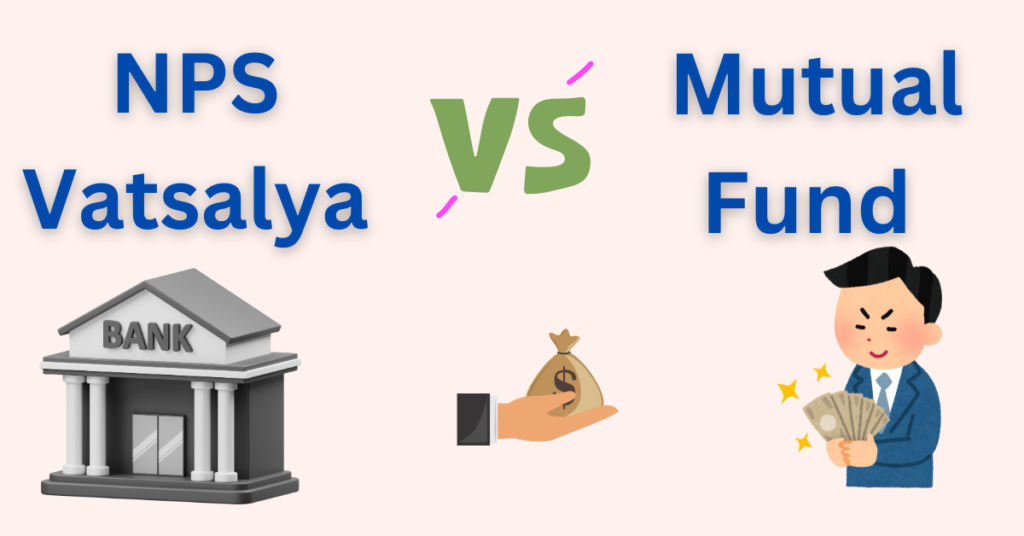Choosing the right investment plan is crucial for financial security. NPS Vatsalya and Mutual Funds are two popular options, each catering to different investment needs. While NPS Vatsalya is designed for long-term savings with tax benefits, mutual funds offer flexibility and higher return potential.
In this article, we compare NPS Vatsalya vs Mutual Funds based on asset allocation, risk-adjusted returns, liquidity, and tax benefits to help you make an informed decision.

What is NPS Vatsalya?
NPS Vatsalya is a child-centric investment scheme regulated by the Pension Fund Regulatory and Development Authority (PFRDA). It allows parents or guardians to invest systematically for their child’s future financial needs.
Key Features of NPS Vatsalya:
✔ Asset Allocation: A balanced mix of equity exposure and debt portfolio for stable returns.
✔ Risk Management: Lower risk compared to equity mutual funds due to regulated investments.
✔ Returns & Growth Potential: Market-linked returns with moderate capital appreciation.
✔ Liquidity Constraints: Funds are locked until the child reaches adulthood, with limited partial withdrawal rules.
✔ Tax Benefits: Investments qualify for Section 80C and 80CCD (1B) tax deductions.
✔ Exit & Annuity Purchase: At maturity, a portion must be used to purchase an annuity, ensuring post-retirement income.
Who Should Invest in NPS Vatsalya?
- Investors seeking a long-term, structured savings plan for their child’s future.
- Parents looking for tax-saving benefits under Sections 80C and 80CCD.
- Individuals preferring a low to moderate risk investment option.
What is a Mutual Fund?
A mutual fund is a professionally managed investment pool where investors contribute funds that are allocated into equity, debt, or hybrid portfolios based on risk appetite and financial goals. These funds are managed by Asset Management Companies (AMC) and regulated by the Securities and Exchange Board of India (SEBI).
Key Features of Mutual Funds:
✔ Fund Management: Active vs Passive Fund Management with professional oversight.
✔ Return on Investment (ROI): Higher returns in equity funds, while debt funds offer stability.
✔ Liquidity & Flexibility: Systematic Withdrawal Plans (SWP) and no fixed lock-in period (except ELSS).
✔ Taxation Rules: Equity mutual funds are subject to capital gains tax, while tax-saving ELSS funds offer benefits under Section 80C.
✔ Risk Factor: Market-linked returns with volatility based on asset class.
Who Should Invest in Mutual Funds?
- Investors seeking higher returns with varying risk exposure.
- Individuals who require liquidity and withdrawal flexibility.
- Those willing to manage market risks for potential long-term capital growth.
NPS Vatsalya vs Mutual Funds: Key Differences
| Feature | NPS Vatsalya | Mutual Funds |
| Regulation | PFRDA | SEBI |
| Fund Management | Pension Fund Managers | AMC-managed funds |
| Risk Level | Low to moderate | Varies (low in debt, high in equity) |
| Return Potential | Moderate, market-linked | Higher in equity, stable in debt |
| Liquidity | Locked till maturity | High (except ELSS funds) |
| Tax Benefits | Section 80C, 80CCD (1B) | ELSS funds under 80C |
| Withdrawal Rules | Partial withdrawals allowed | Freely redeemable (subject to exit load) |
| Exit Requirement | Annuity purchase required | No mandatory annuity |
Which Investment Option is Right for You?
Choose NPS Vatsalya If:
✅ You want a low-risk, long-term savings plan for your child’s future.
✅ You are looking for tax-saving benefits under Section 80C and 80CCD (1B).
✅ You are comfortable with the lock-in period until maturity.
Choose Mutual Funds If:
✅ You want higher returns and are willing to take market risks.
✅ You need liquidity and flexibility, with options for Systematic Withdrawal Plans (SWP).
✅ You prefer investment choices like Equity, Debt, and Hybrid Funds.
Final Verdict: Which One Should You Choose?
If you are looking for a low-risk, tax-efficient investment with a focus on structured savings, NPS Vatsalya is a great option. However, if you want higher returns and liquidity, mutual funds—especially equity funds—are a better choice.
A balanced approach could be investing in both:
🔹 Use NPS Vatsalya for long-term stability and tax benefits.
🔹 Allocate funds into mutual funds for potential capital growth and liquidity.
FAQs
1. Which gives better returns, NPS Vatsalya or Mutual Funds?
Mutual funds, especially equity-focused ones, generally provide higher returns than NPS Vatsalya, but they come with higher risk. NPS Vatsalya offers moderate, stable returns with lower risk exposure.
2. Can I withdraw money early from NPS Vatsalya?
Yes, partial withdrawals are allowed under specific conditions, but full withdrawal is restricted until the child reaches adulthood.
3. Are mutual funds riskier than NPS Vatsalya?
Yes, mutual funds—especially equity mutual funds—are market-linked and can be volatile. NPS Vatsalya is comparatively less risky due to its balanced investment approach.
4. What are the tax benefits of both investment options?
- NPS Vatsalya: Offers Section 80C & 80CCD (1B) tax deductions.
- Mutual Funds: ELSS funds offer tax benefits under Section 80C, but other mutual funds are subject to capital gains tax.
Conclusion
Both NPS Vatsalya and Mutual Funds have their unique advantages. While NPS Vatsalya is a structured, tax-efficient investment for long-term savings, mutual funds provide higher returns, liquidity, and flexibility.
Before investing, consider your financial goals, risk tolerance, and liquidity needs. A diversified approach that includes both options can help create a well-rounded investment strategy.
🔹 Ready to invest? Consult a financial advisor to optimize your investment portfolio today!

